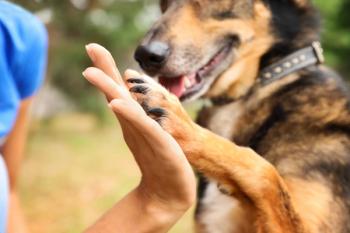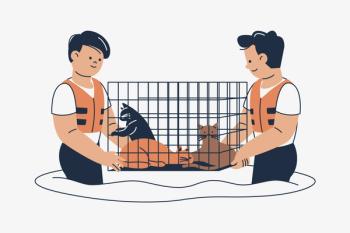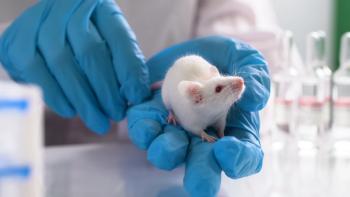
AVMA approves animal welfare principles
Schaumburg, Ill. - Eight standards now serve as the American Veterinary Medical Association's (AVMA) overarching guide to evaluating future animal welfare policies, resolutions and actions.
SCHAUMBURG, ILL. — Eight standards now serve as the American Veterinary Medical Association's (AVMA) overarching guide to evaluating future animal welfare policies, resolutions and actions.
Dr. Gail Golab
They cover issues ranging from conservation and management to treating animals with dignity and respect.
The principles are a first for the association that asserts expertise in the welfare of animals but has been occasionally overshadowed by vigorous activist organizations. To cement veterinary medicine's authority, AVMA created its Animal Welfare Division and formulated an Animal Welfare Advisory Committee, which drafted the principles document in September. With the Executive Board's unanimous approval last month, the division now is charged with abiding by the committee's standards.
"This isn't anything we hadn't already been doing, but it puts it all in one place and acts as our guide," says Dr. Gail Golab, associate director, Animal Welfare Division. "There was a lot of support for this work."
Guiding language
The principles read as follows:
- Responsible use of animals for human purposes, such as companionship, food, fiber, recreation, work, education, exhibition and research conducted for the benefit of humans and animals is consistent with the Veterinarian's Oath.
- Decisions regarding animal care, use and welfare shall be made by balancing scientific knowledge and professional judgment with consideration of ethical and societal values.
- Animals must be provided water, food, proper handling, health care and an environment appropriate to their care and use with thoughtful consideration for their species-typical biology and behavior.
- Animals should be cared for in ways that minimize fear, pain, stress and suffering.
- Procedures related to animal housing, management, care and use should be continuously evaluated and, when indicated, refined or replaced.
- Conservation and management of animal populations should be humane, socially responsible and scientifically prudent.
- Animals shall be treated with respect and dignity throughout their lives and, when necessary, provided a humane death.
- The veterinary profession shall continually strive to improve animal health and welfare through scientific research, education, collaboration, advocacy and the development of legislation and regulations.
Reaction
Feedback concerning the principles remained quiet at presstime. Organizations with more liberal stances as well as activists had not yet reviewed the document.
New digs: Executive Board members hashed out issues in the American Veterinary Medical Association's Headquarters Conference Center. In June, Dr. James Cook (above) and other board representatives approved the $1.9-million renovation that includes state-of-the-art technology, flat screens and expanded office space. Cook has since announced his candidacy for 2007-2008 AVMA president-elect. (Photo: American Veterinary Medical Association)
Dr. Tom Burkgren, executive director of the American Association of Swine Veterinarians, says he was initially turned off by the principle advocating "respect and dignity" but notes the terms apply to practitioner actions only.
He expresses concern for any language that anthropomorphizes animals.
"Would I like that terminology removed? Sure. But it could have been a lot worse," he says.
Mass poultry depopulation
Apart from the principles, poultry welfare caught the Executive Board's attention as they approved the use of water-based foam for the depopulation of poultry. Conditions apply, such as those outlined by the United States Department of Agriculture (USDA).
According to Karen Eggert, public affairs officer with USDA's Animal and Plant Health Inspection Service, those circumstances that call for foam mass depopulation include outbreaks of disease such as highly pathogenic avian influenza or Exotic Newcastle Disease. The depopulation method also should be used only for floor-reared poultry such as broiler chickens and turkeys and birds housed in hazardous buildings. "It's not used for birds in cages," Eggert contends.
One health Summit Busts
When used, the water-based foam system results in the death of 95 percent of birds within seven minutes or less after being submerged, USDA says. If 100 percent of the birds have not been depopulated after 15 minutes, contingencies must exist to dispatch the birds as humanely and quickly as possible in accordance with accepted euthanasia methods, USDA adds.
According to the position statement, AVMA supports added research to evaluate whether water-based foam can act as an acceptable form of euthanasia.
Disabled livestock
Euthanization is immediately recommended for downed swine that fail to recover from treatment.
That's part of the AVMA's new position on disabled livestock, which recommends the animals should be "handled humanely in all situations."
If an otherwise healthy animal is recently injured or ambulatory, it should be treated, shipped to a state or federally inspected slaughter plant or humanely slaughtered on the farm, the recommendations state. Such animals should not commingle with healthy animals during transport.
Euthanasia required for any animal in extreme distress or suffering from an irreversible condition.
One-health collapse: President Dr. Roger Mahr backed a request for a $215,000 summit to gather veterinarians and physicians that failed Executive Board approval. He promises to forge ahead. (Photo: American Veterinary Medical Association)
Wellness guidelines
AVMA leaders also passed wellness guidelines for animals used in animal-assisted activity, therapy and resident animal programs.
The five-page document is designed for DVMs participating in these fields who encounter zoonotic disease risks and behavioral problems. The work is intended to help build knowledge, ensure animal protection and maximize applications of the human-animal bond, the guidelines say.
Principles and dynamics of the guidelines include designing protocols to ensure animals are healthy beyond physical examinations and vaccinations and incorporate continuous monitoring for "total wellness."
This includes becoming familiar with the animal's tasks, conducting screening tests and making recommendations for health maintenance.
Horse protection
In other business, Executive Board members approved $5,500 in membership dues to the American Horse Council's Unwanted Horse Coalition. The group actively pursues defeat of the American Horse Slaughter Prevention Act and devises plans to assist unwanted horses should the federal measure pass Congress.
AVMA opposes the act based on questionable slaughter conditions outside the United States should the practice be banned nationally. The group also is concerned about the welfare of thousands of unwanted equine if horse slaughter is banned.
Dr. Nathaniel Messer of American Association of Equine Practitioners is AVMA's liaison to the coalition.
Adios mentoring center
The AVMA Mentoring Center will no longer exist by the end of this month, and a $30,000 marketing program approved by Executive Board members earlier this year has been scrapped.
Despite recent enhancements to the online center, launched in 2004, the program is not successful. "Participation continues to be well below the targeted levels," officials say.
As of August 2006, just 329 mentees and 649 mentors participated in the program. While some mentees reported they were searching for mentors, only 30 mentees actively engaged in a mentoring relationship.
Newsletter
From exam room tips to practice management insights, get trusted veterinary news delivered straight to your inbox—subscribe to dvm360.





